Last Updated on February 22, 2025 by Owen McGab Enaohwo
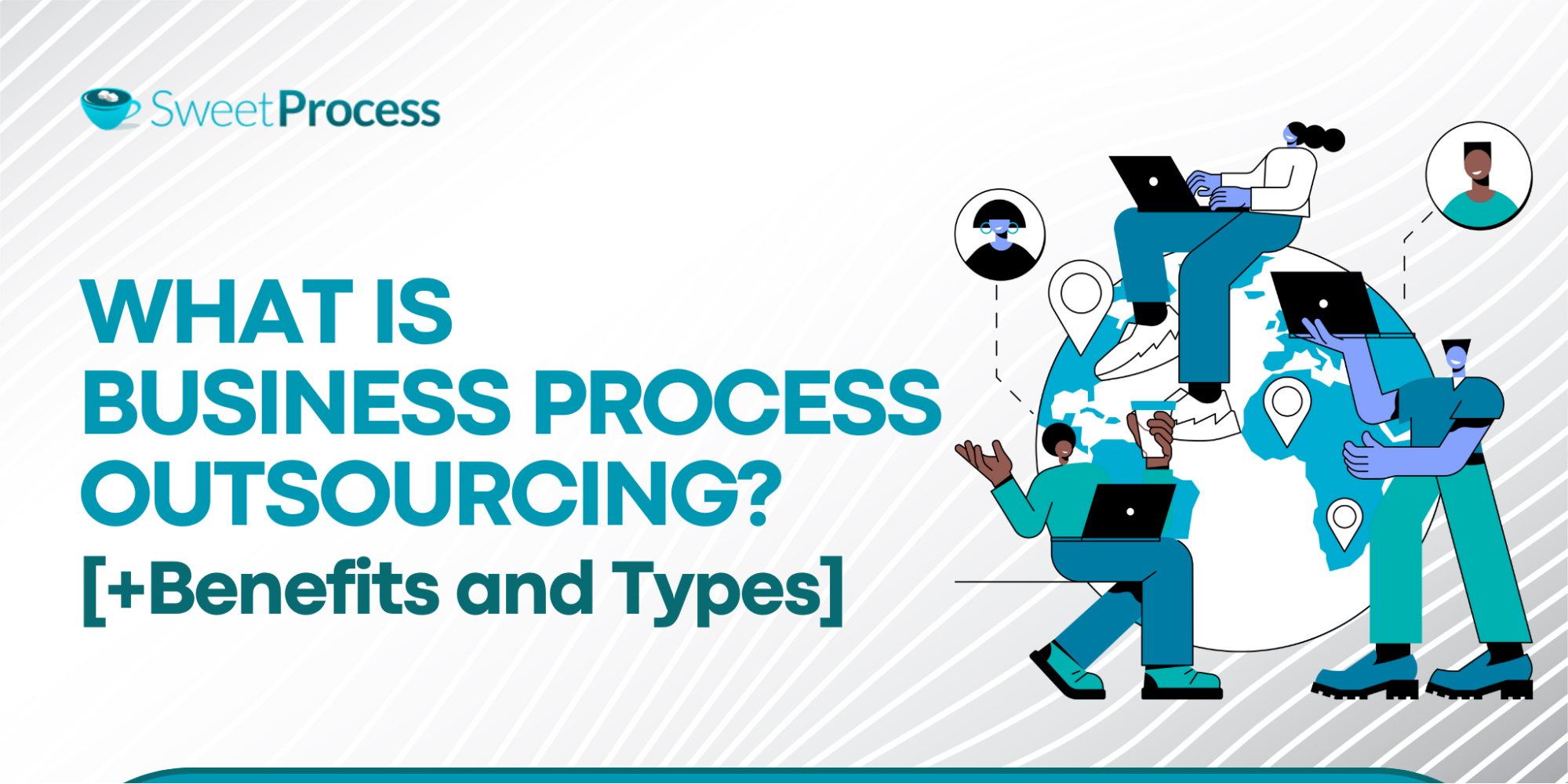
Managing the multiple aspects of a growing business can be overwhelming. From overseeing daily operations and managing teams to strategic planning and handling contracts, the constant demands can lead to burnout, mistakes, and even health problems if not managed effectively.
In the past, most business owners handled these responsibilities themselves or relied on a small internal team to manage them. Outsourcing was often considered unnecessary or only reserved for large corporations with expansive resources. However, as businesses scaled and the need for efficiency grew, many began to realize the benefits of delegating non-core tasks to external experts.
This is the promise of business process outsourcing (BPO): a strategy that allows companies to outsource certain functions and focus more on their core competencies.
While all this sounds ideal, here are some key considerations to help you outsource successfully:
- How can you make that happen without losing control over quality or operational efficiency?
- How do you know what to outsource and to whom?
- What are the best practices for selecting and managing BPO providers to ensure they meet your standards?
- What are the benefits and challenges of outsourcing?
- Which tools should your BPO company have?
In this guide, we’ll answer these questions and more, walking you through the essential aspects of BPO to help you successfully implement it in your business.
Let’s get to it.
Ready to optimize your business processes? Learn how outsourcing the right tasks can improve efficiency and reduce costs.
Sign up for a free 14-day trial of SweetProcess today and start streamlining your BPO management!
What You’ll Learn In This Guide:
What Is Business Process Outsourcing?
Types of Business Process Outsourcing
How Does Business Process Outsourcing (BPO) Work?
How to Equip Your BPO Vendors Using SweetProcess
9 Benefits of Business Process Outsourcing
Pitfalls of Business Process Outsourcing
Business Processes You Can Outsource
How to Choose a BPO Provider for Your Organization
Manage Your Company’s BPO Tasks With SweetProcess
What Is Business Process Outsourcing?
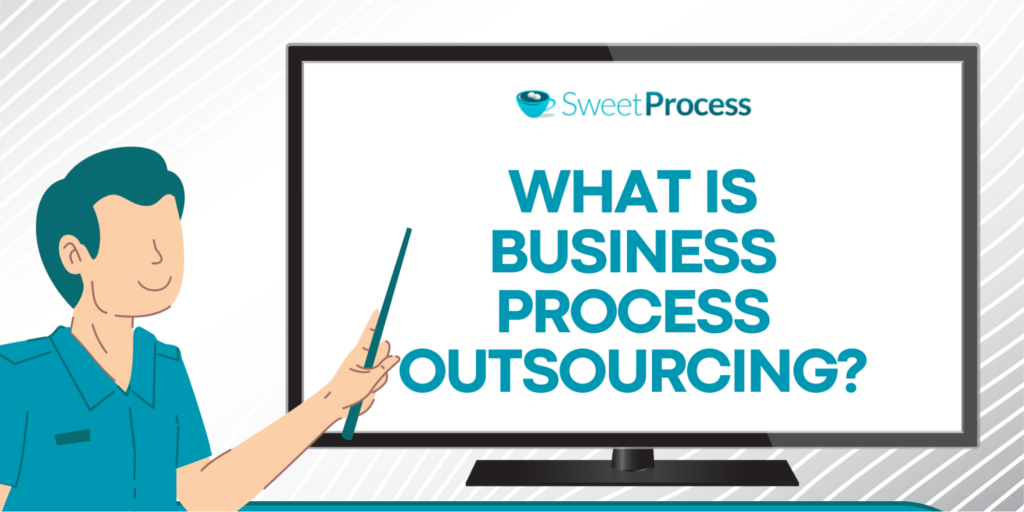
Business process outsourcing (BPO) involves delegating specific business functions and processes to external vendors or third-party service providers. Organizations typically outsource non-core business functions that are not related to their mission.
Some of the common business processes that you can outsource to BPO providers include:
- Payroll
- IT services
- Data entry
- Customer support
- Accounting
- Human resources management
- Marketing
Once you subcontract these tasks, your business can focus on the primary objectives, such as market expansion or product development, without affecting the critical support functions.
For example, a small e-commerce company might outsource customer service to a BPO provider, enabling the internal team to focus on product sourcing and marketing. Similarly, larger organizations may outsource IT or accounting functions to ensure consistent performance while minimizing costs.
This way, you scale much quicker without sacrificing the quality of your products and services.
Types of Business Process Outsourcing
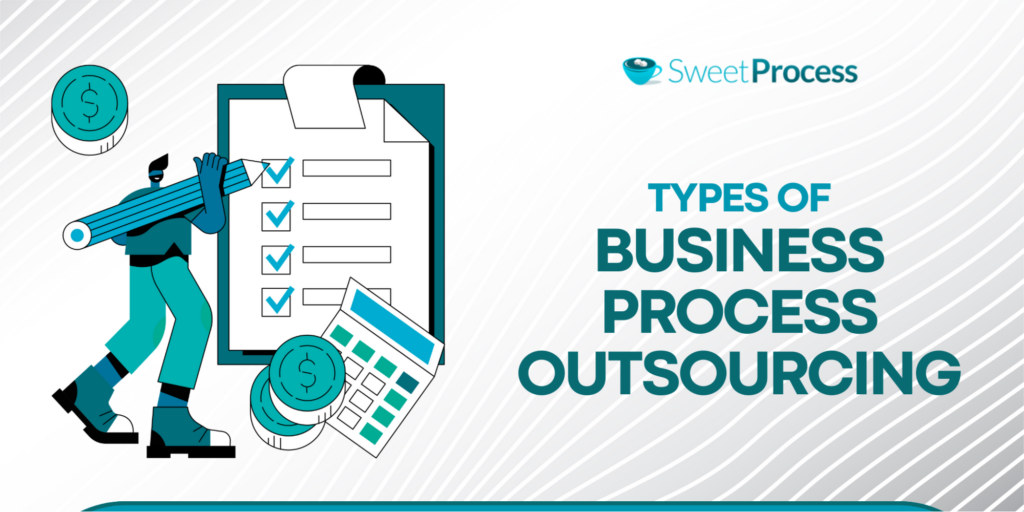
BPO has become quite common in almost every industry today. Data by Grand View Research shows that the BPO market is expected to hit the $525.23 billion mark by 2030 as more organizations focus on their core competencies.
This growing trend means companies need to choose the best BPO strategy that meets their needs. BPO comes in different forms – depending on where the outsourcing provider is located in relation to the business. Here are the outsourcing types you need to know:
Local/Onshore Outsourcing
Local or onshore outsourcing involves subcontracting domestic third-party providers to handle business functions. In short, they should be within the same country or region as your business. For instance, a US-based company will delegate its processes to a local provider within the same state or city.
This outsourcing type of arrangement offers several benefits:
- Easier communication: Language barriers and time zone differences are minimized since both parties are in the same country.
- Cultural alignment: Shared cultural norms can lead to better understanding and smoother collaboration.
- Legal and regulatory compliance: There are fewer concerns about adhering to international laws, tariffs, and regulations.
Best for: Companies that value close collaboration and quick response times or prefer to work with service providers within the same legal framework.
Offshore Outsourcing
Sometimes, a business might outsource its processes to providers in a different country or region to lower labor costs. Nike is a good example. The company outsources a significant portion of its production to factories in Indonesia, Vietnam, and China to reduce costs. Offshore outsourcing is commonly used for customer support, IT services, and back-office operations.
It also comes with multiple benefits including:
- Cost savings: Organizations can take advantage of lower labor costs in certain regions, such as Southeast Asia or Eastern Europe.
- 24/7 availability: Outsourcing to different time zones can enable round-the-clock operations, which is especially useful for customer support.
- Scalability: It offers the ability to scale services quickly and efficiently.
Best for: Companies looking to reduce expenses significantly, especially for non-core tasks that don’t require real-time collaboration or cultural alignment.
Near-Shore Outsourcing
Nearshoring involves outsourcing services to countries geographically close to the company’s location but typically in a different region. For example, a company in the US might outsource certain functions to countries in Latin America, such as Mexico or Costa Rica. Near-shore outsourcing strikes a balance between cost savings and proximity.
It’s also beneficial in several ways:
- Lower costs than onshore outsourcing: While not as cheap as offshore outsourcing, near-shore providers typically offer lower labor costs than local providers.
- Cultural similarities: Countries in similar time zones often share cultural traits and language, leading to smoother interactions.
- Easier communication: Time zone differences are less of an issue compared to offshore outsourcing, allowing for more frequent communication and collaboration.
Best for: Companies that want the benefits of cost savings without the significant challenges of managing offshore outsourcing, such as language barriers and time zone discrepancies.
No matter which type of BPO you choose, managing the relationship is important to ensure that your outsourcing efforts lead to the desired outcomes.
How Does Business Process Outsourcing (BPO) Work?
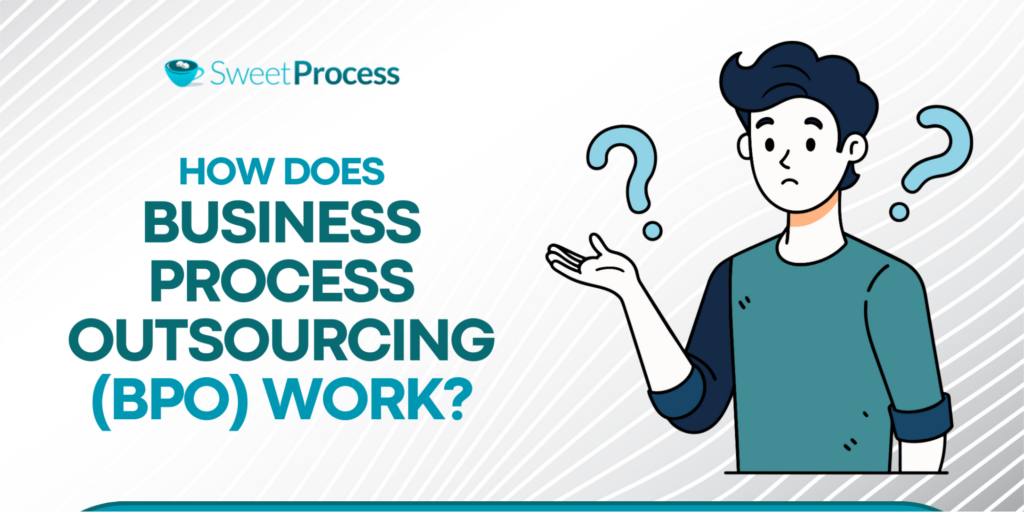
Of all the business processes you handle in your organization, which one should you delegate to a BPO vendor? In this section, we will break down the steps involved in implementing a BPO strategy and how to choose the best option.
Deciding to Adopt BPO
Just because your competitor outsources some functions doesn’t mean you should do the same. First, determine whether it’s in line with your business goals. Most companies implement BPO to increase efficiency, reduce costs, or gain the expertise they lack internally.
Before delegating, evaluate if the outsourcing will enhance your service quality. For instance, if your support agents are overwhelmed by tickets and customer support calls, you might hire an experienced BPO provider to handle these costs without increasing your overhead costs or recruiting more agents.
Identifying Tasks to Outsource
Once you’ve decided to adopt BPO, conduct a business process analysis to determine which operations your team can handle comfortably. At the same time, identify tasks and processes that would benefit most from outsourcing. This step is essential because all core activities should be executed internally.
However, tasks that are repetitive, time-consuming, or require specialized skills like data entry or customer service are ideal candidates for outsourcing. To identify these tasks:
- Review the tasks performed by internal teams.
- Identify areas where internal staff are overwhelmed or where processes can be standardized.
- Evaluate whether outsourcing would result in time and cost savings without compromising quality.
Choosing a BPO Provider
Let’s face it. With the growing BPO market, there are hundreds of vendors to choose from. Picking the wrong one might cost you a lot of time and resources. Before choosing a provider, here are the key things to consider:
- Research potential providers and assess their track record and client testimonials.
- Compare the service offerings, expertise, and pricing models of different providers.
- Evaluate their technological capabilities and ensure they can integrate with your existing systems.
- Build a relationship with your provider based on trust, transparency, and clear communication.
- Pick a partner that’s known for a quick turnaround time.
Deciding Contract Type
What are the timelines for the contract? What is the scope of work? What are your performance expectations?
For your partnership to work, you need to answer these questions and define the terms of the outsourcing arrangement. You can opt for a fixed-price contract based on a standard fee or a performance-based contract in which the BPO service provider is paid based on the achievement of specific performance metrics.
A well-structured contract helps ensure a smooth relationship between you and the BPO provider.
Transferring Outsourced Roles
Now that you have a partner, you need to update them on how your business operates. A smooth transition lets you transfer the necessary roles and responsibilities to your chosen BPO provider.
This can involve training the outsourced team, providing them with the necessary resources, and ensuring they understand your company’s values, goals, and processes. For instance, if you run a manufacturing business and have just hired a customer support team, they must be fully equipped to handle inquiries about your company, products, and services.
On top of training the team, you can also:
- Securely transfer relevant data and information to the provider.
- Establish effective communication channels to facilitate collaboration and address any issues.
If you have implemented business process automation techniques, you can give the BPO provider access to your software or company tools for easier knowledge transfer.
Evaluating Vendor Performance

The only way to know whether the BPO provider meets your needs is by constantly evaluating their performance. Establish key performance indicators (KPIs) at the beginning of the contract and use them to measure progress.
You can also schedule regular check-ins and meetings with the business process outsourcing companies to share and receive feedback. This way, you can adjust workflows based on the insights to maintain a solid relationship. Continuous monitoring ensures that the tasks are completed to the required standards, deadlines are met, and costs are kept in check.
How to Equip Your BPO Vendors Using SweetProcess

To effectively manage and equip your BPO vendors, you need a system that streamlines communication, documents processes, and ensures quality control. SweetProcess is an ideal tool for this purpose. It offers an easy-to-use platform for documenting, assigning, and tracking your business processes.
Here’s how to use SweetProcess to empower your BPO vendors and ensure successful outsourcing.
Create Your Company’s Procedure
Creating a comprehensive procedure ensures that everyone involved, including your outsourced team, is aligned on how tasks should be executed. Here’s how to use SweetProcess to map out procedures:
- Log in to SweetProcess.
- Select “Procedures” at the top bar.
- Click “Create Procedure.”

- Give your procedure a title.

- Draft your procedure details. You can also attach media such as images, tables, and videos.

SweetProcess offers AI features that allow you to draft the procedure using SweetAI. To use this option, add a title and click “Write with SweetAI.” Your procedure should be ready within seconds. You can edit the details.
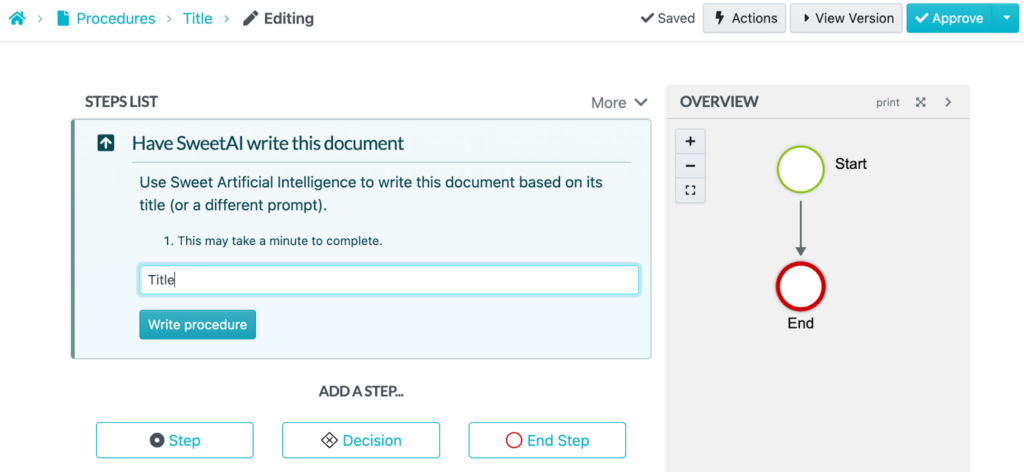
Document Your Company’s Processes
SweetProcess offers a centralized location where all business processes can be documented in one place. This ensures your BPO vendor has access to the most up-to-date processes and reduces the risk of errors or misunderstandings. Here’s how:
- Click “Processes” on the top bar.
- Tap “Create Process.”

- Give your process a title.
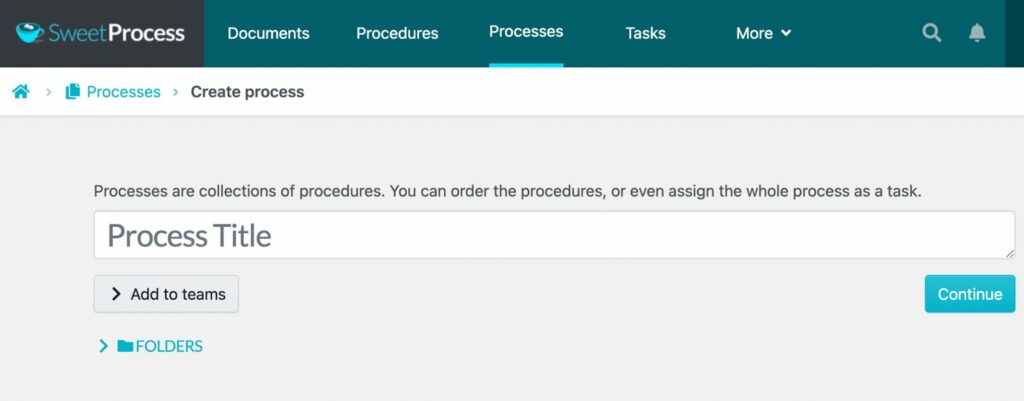
- Make your process comprehensive by adding more information, such as videos, images, and tables.
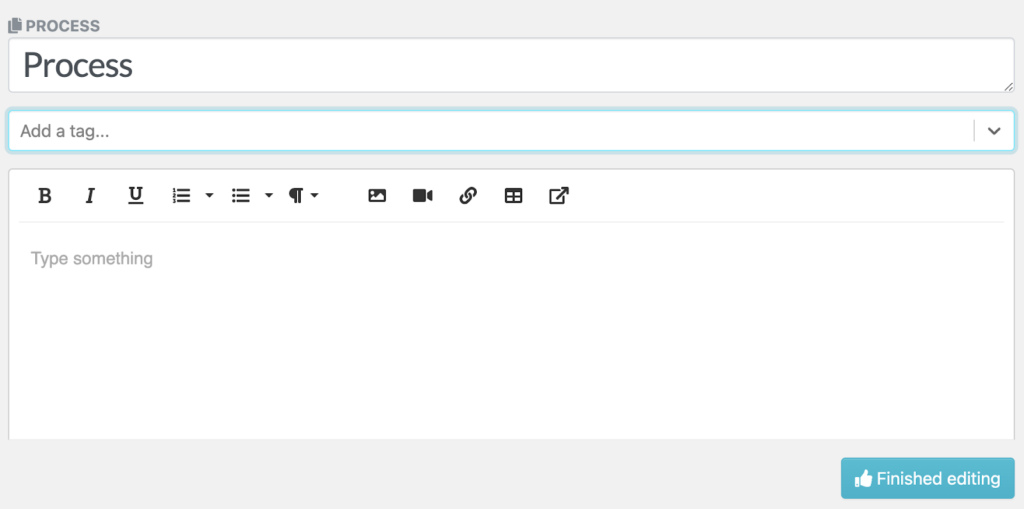
- Click “Finished Editing” to save your changes.
Add a Procedure to a Process
Adding a procedure to a process helps create a clear workflow so your BPO vendor knows exactly what steps to follow for each task. Follow these steps:
- Open an existing process from your dashboard or create a new one.
- If creating a new one, add a title, assign it to teams, and click “Continue.”

- Scroll down to the “Add Step” button.
- Select “Procedure” from the pop-up box.
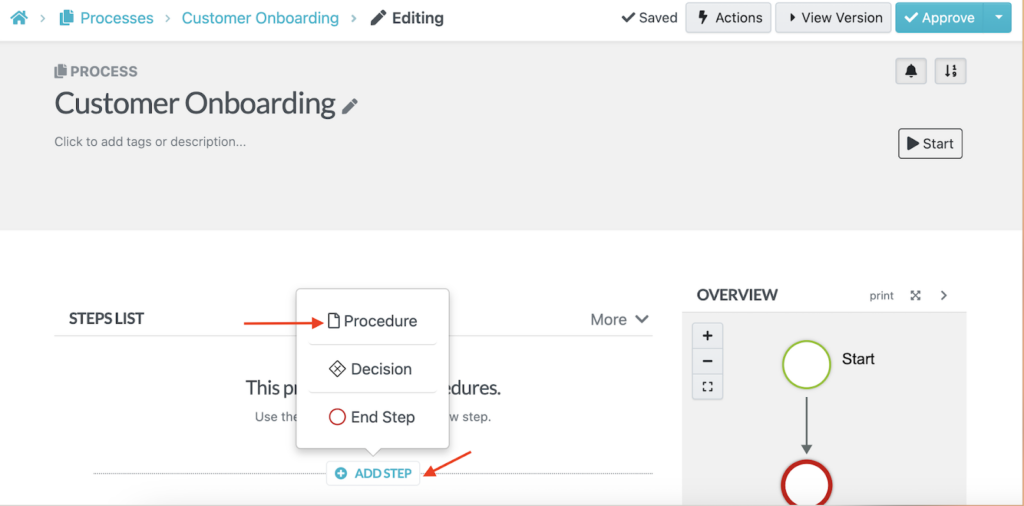
- Search for an existing procedure or add a new one.

- Keep adding procedures until done.
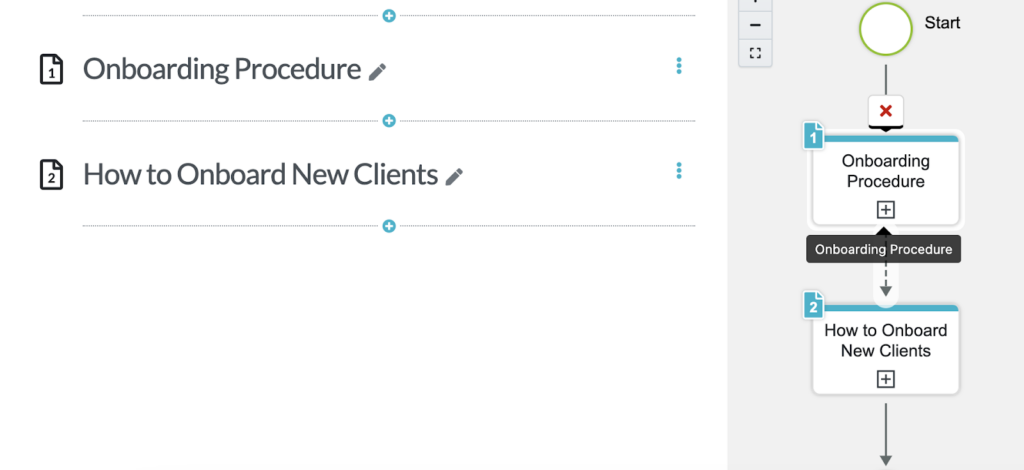
Assign Your Procedures as a Task

With SweetProcess, you can assign tasks directly to your BPO vendor, track completion, and set deadlines. This ensures accountability and helps you maintain control over outsourced processes.
- Open the procedures tab on the dashboard.
- Click on the three dots to select your procedure.
- Tap “Assign as Task.”
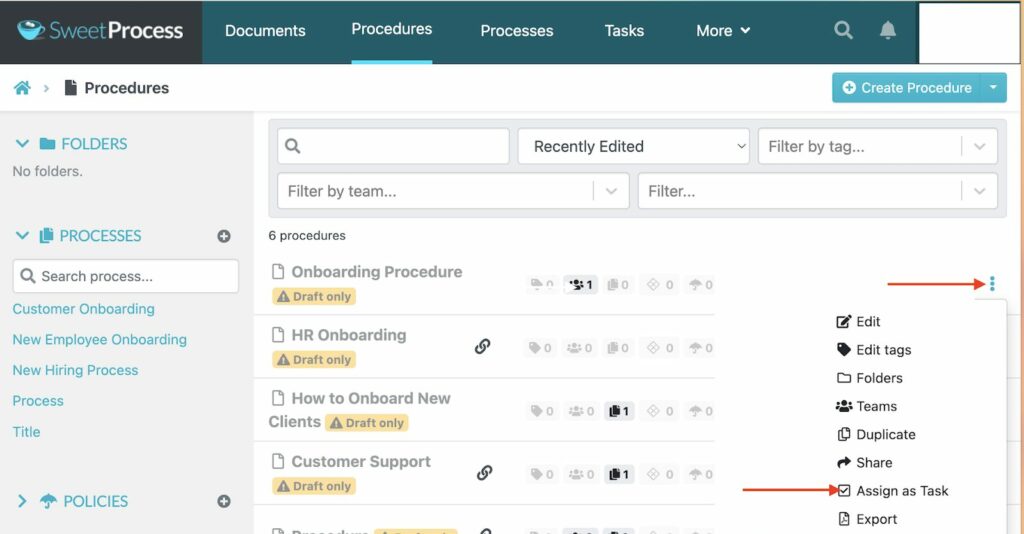
- Assign this task to the team members or BPO vendor.
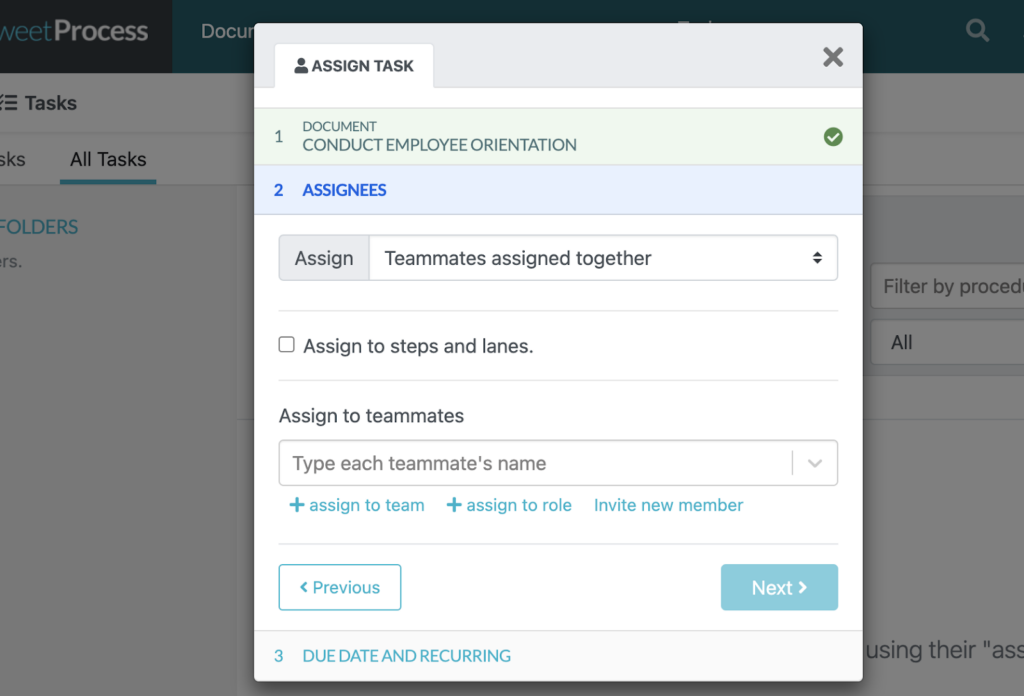
Manage Your Company’s Processes
You must continuously monitor, update, and optimize your business processes to maintain quality control and efficient operations. The SweetProcess dashboard is easy to use and intuitive; you can seamlessly edit, delete, or update your company process. Here’s how:
- Head to the “Processes” tab.
- Scroll to the specific process you want to edit, share, or export.
- Click the three dots on the right and choose an action.
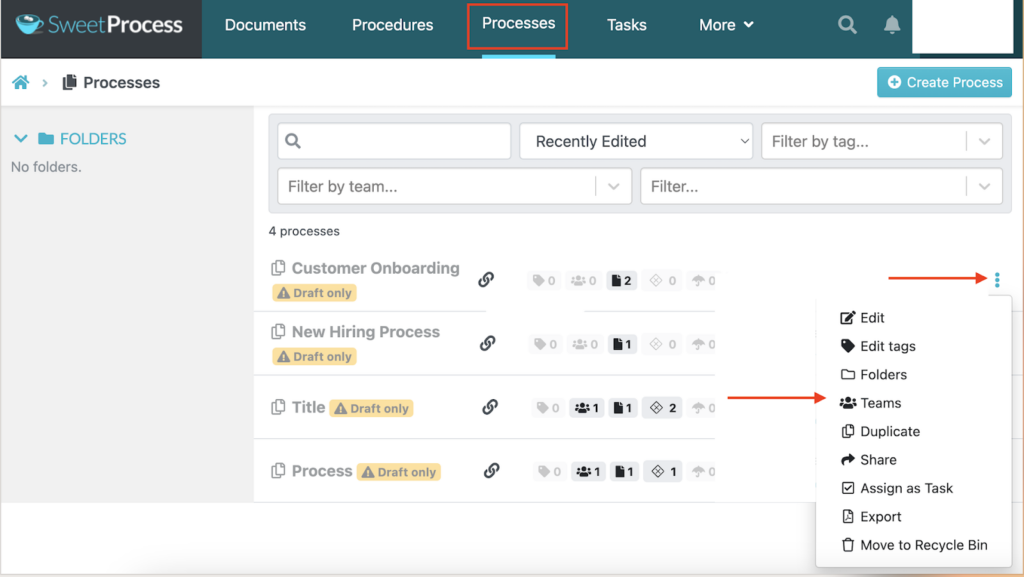
Collaborate With Team Members

Collaboration is key to successful BPO outsourcing. You must ensure that your internal team and external BPO vendor are always on the same page. SweetProcess makes collaboration easy by allowing you to communicate directly within the platform, share files, and review tasks in real-time.
Follow these steps to create and assign tasks so that everyone is on the same page:
- Open the “Tasks” tab.
- Select “Assign Tasks.”

- Assign tasks from existing processes or procedures.
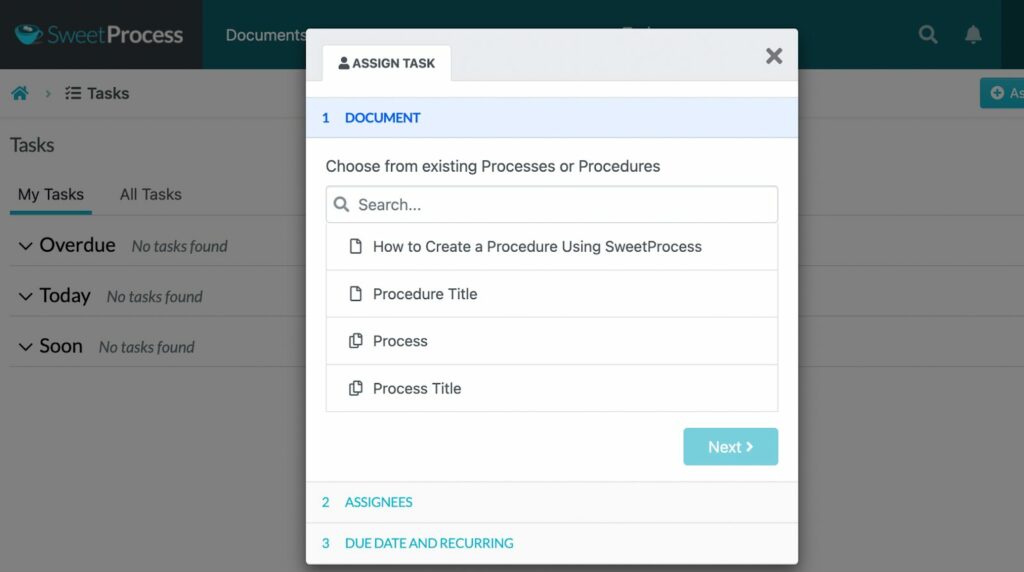
- Select the specific team members in the “Assignees” section.
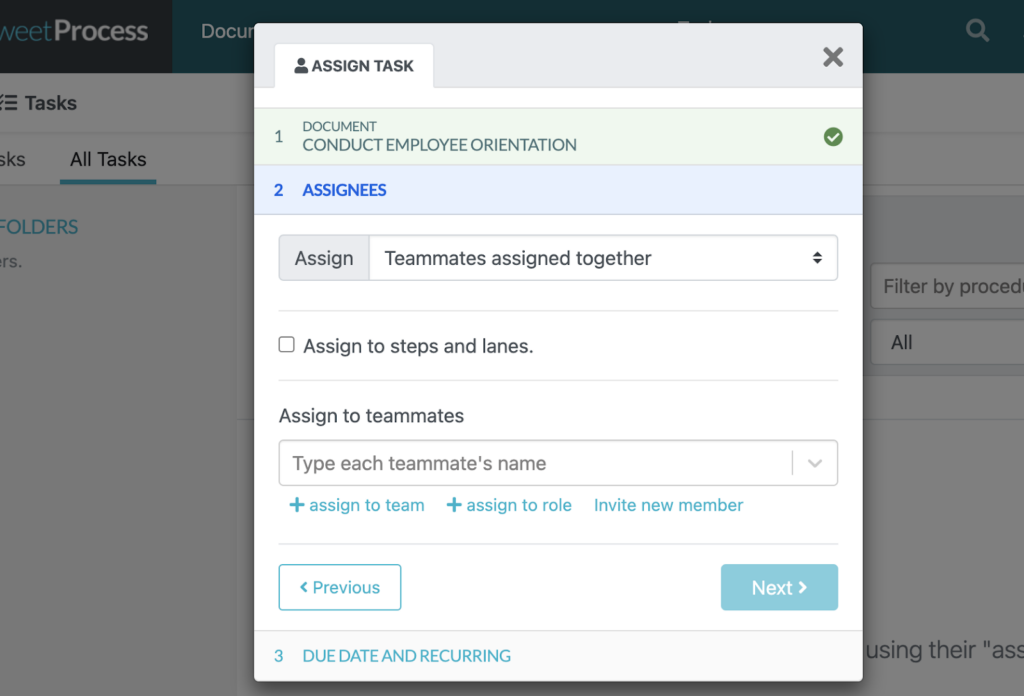
- Include a due date for tracking.
You can also view which tasks have been completed.
- Under the “Tasks” section, click “All Tasks” to view the list.

Business owners are adopting SweetProcess to simplify their processes.
One of them is Good Nature Organic Lawn Care. With 21 years of experience in the industry and 40 full-time staff, the company has built a reputation for safe and effective lawn care with a commitment to safety and environmental responsibility.
However, the company faced significant challenges in managing its business processes. With every update or change, its original manual processes became obsolete. Employees often struggled to follow the outdated manual, leading to mistakes, time spent correcting errors, and inconsistent service delivery.
This lack of clarity affected productivity and the company’s ability to scale. After seeing a friend’s success with a workflow management system, Alec McClennan, the CEO, decided to try SweetProcess. He found this tool much simpler and more efficient than other alternatives. The transition to SweetProcess came with multiple benefits, including:
- Simplified employee onboarding: New hire onboarding became more efficient, with employees having access to detailed, easy-to-follow processes.
- Effective business process documentation: SweetProcess allowed the company to document and update processes easily.
- Standardized operations across locations: They achieved uniformity in operations, enabling the company to expand to new locations without reinventing processes.
Ginkgo Residential has also benefited from SweetProces, which improved employee knowledge thanks to effective business process documentation. The real estate company faced a significant knowledge gap among its employees. Despite documenting processes in PDFs and manuals, they were difficult to navigate, outdated, and failed to provide employees with clear, accessible information.
This resulted in inefficiency, mistakes, and inconsistent performance, particularly when employees were unsure about specific tasks or roles. Sarah Genay, portfolio analytics manager, and her team were looking for a better way to document their processes. After evaluating several options, they chose SweetProcess for its ease of use and flexibility.
With SweetProcess, they now can:
- Enhance business process documentation: They can create clear, interlinked processes, improving accessibility and clarity compared to their old PDF system.
- Onboard and train employees faster: SweetProcess provided clear procedures that new hires could follow independently.
- Decentralize knowledge: Knowledge is no longer siloed with individual employees and can be accessed by anyone at any time.
- Continuous improvement: Ginkgo Residential embraced a culture of continuous improvement by regularly updating and refining their processes in SweetProcess.
9 Benefits of Business Process Outsourcing

BPO has become a go-to strategy for many businesses aiming to improve their overall operations. What benefits will you get by implementing this practice in your organization? Let’s take a closer look:
Increased Competitive Advantage
Paying attention to your core business activities enhances the ability to scale operations without overburdening internal resources. With this time and resources, you can invest more in product development, innovation, or strategic planning while the external provider handles other business functions like logistics and IT support.
Delegating these tasks helps you achieve faster market response times and have enough time to outsmart your competitors.
Access to Innovative Technologies
Every year, new technologies are coming up. For instance, artificial intelligence and cloud computing have become important for streamlining business processes. Instead of staying up-to-date with all the evolving technologies, you can rely on outsourcing partners at the forefront of adopting these technological trends.
While your small business may need more resources and budget to implement advanced technologies internally, a BPO provider will provide the necessary support, saving you costs.
Higher Quality and Better Performance
Think of all the specialized expertise you can access by outsourcing some functions. BPO providers are experts in their respective domains and typically have highly skilled teams dedicated to specific tasks.
Their quality of service is much higher because they have dedicated resources, refined processes, and continuous business process improvement initiatives that your internal teams might need.
Improved Flexibility
Instead of hiring and onboarding more employees during high seasons, you can contract BPO vendors. They are highly flexible, which is especially valuable for industries with fluctuating demand. Whether handling a seasonal surge in demand or expanding into new geographic markets, outsourcing ensures businesses can remain responsive.
For instance, if you run a fashion retail store, you might outsource the warehousing and order fulfillment during the holiday season to ensure it can manage the surge in orders without investing in additional infrastructure or employees.
Cost Savings
Renowned companies like Apple outsource some services to offshore providers to save on production costs. Outsourcing to regions with lower labor costs allows you to significantly reduce your capital expenditures and operational costs while maintaining or even improving service quality.
You don’t need to invest in expensive infrastructure, technology, and training programs.
Risk Management

Although technology is advancing fast, it comes with significant security risks. A report by CyberArk shows that at least 93% of companies encountered two or more identity-related data breaches within the past year. Because of such challenges, your business must invest in risk management practices.
Business process outsourcing transfers some business risk to specialized vendors. For instance, an IT company can mitigate the risk of data breaches since it has a better understanding of security standards and regulatory requirements. This reduces the potential for legal and compliance issues.
Reduces Overworked Employees
Handling all activities in-house increases the risk of overburdening your employees—especially if the tasks are not aligned with their core competencies. Overworked employees lead to:
- Severe burnout
- Decreased productivity
- Higher turnover rates
Outsourcing non-core tasks like data entry, payroll, or IT support allows your in-house teams to focus on more strategic and high-value activities, driving growth and boosting customer engagement.
Access to Top Talents
Let’s say you need an app for your small business. You can outsource the development to a BPO provider with a team of machine-learning experts. Additionally, you can delegate the work to freelancers since 47% of them offer skilled services such as IT, marketing and business consulting.
Such professionals have the necessary skills to complete your project; therefore, you won’t have to hire an in-house team or increase your training expenses.
Expand Coverage
For services like customer service and technical support, you need to offer timely assistance 24/7. This is especially important for global businesses that operate across multiple time zones and need to provide round-the-clock support.
Outsourcing services to a provider in another country expands your coverage, enables you to meet customer expectations, and gives you a competitive advantage globally.
The benefits of business process outsourcing are clear. To effectively manage your outsourced tasks, start your free trial of SweetProcess today and optimize your BPO strategy for greater success!
Pitfalls of Business Process Outsourcing

While BPO offers numerous benefits, it has some risks and challenges. Below are some of the common issues companies face when outsourcing and how they can impact operations:
Public Backlash
You could encounter public backlash as you outsource to offshore companies to save costs. A good example is Apple, which faced criticism for outsourcing manufacturing to overseas suppliers, which led to concerns about the ethical implications of working conditions in some offshore locations. Outsourcing can be perceived negatively by customers and employees if they believe the company is prioritizing lower costs over local employment.
Communication Barriers
Language and cultural differences can create significant communication barriers when outsourcing to different countries or regions. These barriers can make it difficult to align expectations and ensure smooth collaboration, leading to mistakes, delays, and a breakdown in service quality. Additionally, time zone differences can complicate communication further, leading to delays in problem resolution or project updates.
Security Breaches
Outsourcing, especially when dealing with sensitive customer data, increases the risk of security breaches. Data privacy and cybersecurity are critical concerns when sharing information with third-party providers. For example, Target faced a massive data breach when hackers gained access through an outsourced vendor. The breach affected millions of customers and resulted in substantial financial losses.
When outsourcing critical functions such as IT support or data entry, ensure that your BPO provider follows strict security protocols.
Over-Reliance on External Service Provider
Imagine delegating your software business functions to a third-party provider who fails to deliver timely updates during a systems update. This could cause widespread disruptions in operations and even lead to customer churn. When outsourcing, ensure you are not entirely dependent on the external vendor for critical functions that could impact your daily operations. Have a backup to keep operations going in case of hiccups.
Increased Potential for Disruption
A good practice for business outsourcing is to ensure the external BPO provider is aligned with internal operations. Failing to coordinate this arrangement increases the risk of disruption. Implementing a business process management system provides a proper communication plan between you and the BPO team. This allows you to communicate easily when company procedures and policies are introduced, accelerating implementation.
Unforeseen or Higher Costs
While outsourcing is often done to reduce costs, businesses may face unexpected or higher costs if they don’t plan properly. These costs can arise from:
- Hidden fees
- Poor vendor management
- Quality issues that require additional resources to fix
Additionally, you might need to spend more time managing the outsourced vendors and training them on your business processes.
Regulatory Compliance Requirements
Before hiring a BPO vendor, confirm that they comply with relevant industry regulations. For instance, if your business is in healthcare, the external provider must adhere to the Health Insurance Portability and Accountability Act (HIPAA) regulations to avoid legal issues and financial consequences.
Loss of Control
Sometimes, you could experience a perceived or actual loss of control over your business processes. Delegating means the external provider has to meet deadlines, adhere to standards, and manage their operations in alignment with your expectations. If the service provider falls short in any of these areas, it can be challenging to fix it quickly.
For instance, if your marketing team outsources social media management, you might lose control over the company’s tone of voice or customer interactions, leading to inconsistencies that damage the brand’s reputation.
Business Processes You Can Outsource

Business process outsourcing can cover a wide range of activities within a company. Let’s take a closer look at some of the most common business processes that companies choose to outsource:
Payroll
Payroll management is a time-consuming task. It becomes even more complex as your company grows and the number of employees increases. Outsourcing this business function ensures you have a qualified team handling everything from tax calculations to direct deposit payments and ensuring compliance with local, state, and federal regulations.
This allows your business to free up valuable internal resources and avoid costly payroll mistakes. You can also focus more on employee engagement.
Call Center Customer Service
Companies like Amazon are known for outsourcing their efficient customer support services. They outsource tasks like answering product inquiries and resolving order issues to external teams. This strategy boosts customer satisfaction because customers can access 24/7 support. Outsourcing such services will also help you reduce your investments in infrastructure or staffing.
Supply Chain Management
Managing supply chains involves coordinating inventory management, logistics, and distribution. You could delegate some portions of the supply chain to an expert third-party provider to reduce overhead costs and improve efficiency. This approach will also provide flexibility in scaling operations to meet demand fluctuations.
Accounting
As a small and medium-sized business, you must manage your expenses wisely. For this reason, you need an accountant. However, instead of hiring in-house accounting teams, you can outsource and have a third party handle bookkeeping, tax preparation, and financial reporting. These professionals know the right tools to use, and they will keep your financial records up-to-date and in compliance with regulations.
Data Entry
Data entry tasks are repetitive and tedious. Your internal team could focus on higher-value tasks while you delegate this activity to a BPO vendor. For instance, freelance platforms like Fiverr and Upwork have professionals who specialize in data entry. These individuals can process large amounts of data faster, saving your team time and resources.
Outsourcing common business processes can significantly improve efficiency, reduce costs, and allow your team to focus on more strategic initiatives. With a tool like SweetProcess, you can easily document, track, and manage your outsourced processes. Try SweetProcess!
How to Choose a BPO Provider for Your Organization

Your choice of a BPO provider can impact your company’s expenses and overall success. You require a structured approach that aligns with your organizational culture, needs, and long-term goals. Here’s a step-by-step guide to selecting the right BPO partner for your business.
Define the Requirement
To determine your requirements, here are the key questions to ask:
- What processes are best suited for outsourcing?
- What are the expected outcomes, such as cost savings, efficiency, or scalability?
- What are the skill sets and expertise required from the provider?
This will help you define the specific business functions you want to outsource, such as customer service, payroll, data entry, or IT support. This information lets you narrow down the providers specializing in those areas.
Publish a Request for Proposal (RFP)
Once you’ve defined the scope of your outsourcing needs, the next step is to issue a request for proposal (RFP). An RFP outlines your requirements in detail and invites potential providers to submit proposals on how they can meet those needs. It’s important to include:
- Detailed description of business processes to be outsourced
- Required service levels and performance metrics
- Timeframe and budget constraints
- Evaluation criteria for selecting the provider
After receiving the bids, you can determine which vendor can effectively address your needs.
Select a Vendor
During the selection process, you need to evaluate the BPO vendors based on factors such as:
- Their expertise in the specific area of outsourcing
- Past client references and case studies
- Financial stability and scalability
- Alignment with your company’s values and culture
If possible, arrange for interviews or meetings to discuss their approach and capabilities in more detail.
Negotiate the Contract
Before you start any work, it’s essential to sign a contract. This legal agreement outlines the terms and conditions that will guide your partnership. This contract should cover:
- Scope of work and detailed deliverables
- Payment terms and cost structure
- Performance metrics (SLAs) and penalties for non-compliance
- Confidentiality and data protection clauses
- Dispute resolution mechanisms
Negotiating a mutually beneficial contract sets the foundation for a successful partnership.
Transfer the Workload and Regularly Evaluate Performance
With the contract signed, you are now ready to transfer the workload to the BPO provider. The process involves these key steps:
- Providing comprehensive training to the vendor’s team on your business processes and tools
- Setting up monitoring tools to track performance metrics
- Conducting regular performance reviews and gathering feedback from stakeholders
- Making adjustments to the outsourcing agreement as needed to ensure continuous improvement
A successful BPO relationship depends on regular assessments and the willingness to adapt to changing business needs.
To ensure that your outsourcing processes run smoothly, sign up for a free 14-day trial of SweetProcess today and start documenting, managing, and optimizing your business processes with ease.
Manage Your Company’s BPO Tasks With SweetProcess

The benefits of business process outsourcing are undeniable, from cost reduction to increased flexibility and the ability to focus on what matters most to your business. However, to truly maximize your BPO efforts, you need the right system. This way, you can keep track of multiple outsourced tasks and ensure quality.
SweetProcess is the go-to tool for this task. This robust business process management software documents, organizes, and tracks outsourced processes, ensuring everything runs smoothly. With SweetProcess, you can create standardized workflows, evaluate vendor performance, and make adjustments in real-time—all from one central platform.

